To elevate your skills and expertise, I've found 13 advanced methods that truly work. Whether you're a musician using the Rubank Advanced Method for saxophone or clarinet, or a writer looking to refine your craft, there's something here for you. Fitness enthusiasts can explore effective weight training strategies. Each method is designed to challenge you and foster growth. Stick around, and you'll discover more insights and resources to help you on your journey.
Key Takeaways
- Assess your current skill level to select advanced methods that present appropriate challenges and foster growth.
- Balance technical exercises with practical applications to enhance retention and understanding of complex concepts.
- Engage with diverse resources, including structured courses and user feedback, to accommodate different learning styles.
- Incorporate real-world examples and continuous practice to bridge theory and practical application effectively.
- Utilize study groups and workshops to encourage collaboration, idea exchange, and deeper comprehension of advanced topics.
Rubank Advanced Method – Saxophone Vol. 1 Music Book
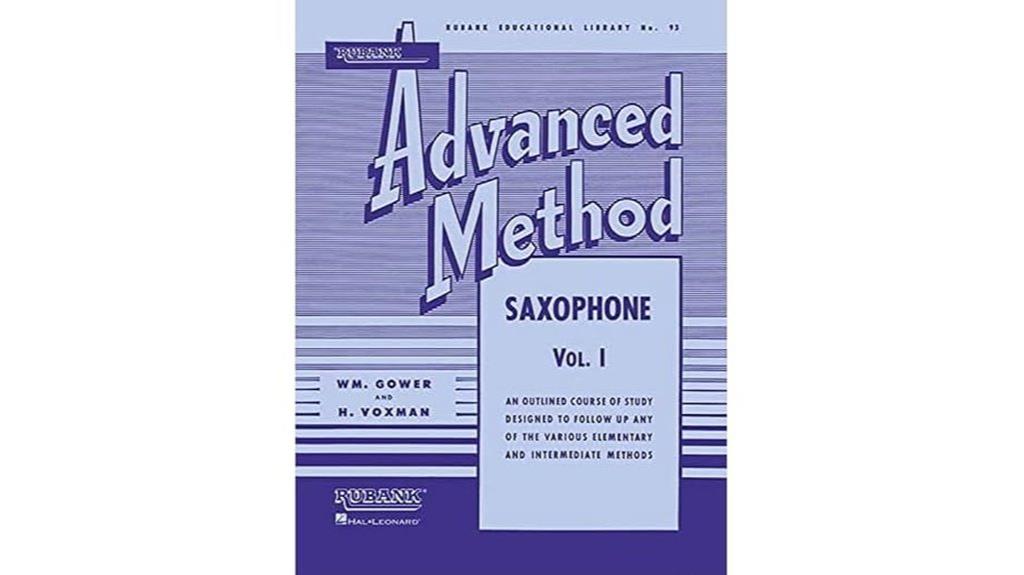
If you're serious about mastering the saxophone, the "Rubank Advanced Method – Saxophone Vol. 1" is an invaluable resource. This book offers a structured approach with 40 lessons, focusing on essential skills like scales, fingerings, and articulation. I've found the exercises incredibly helpful for refining my technique, especially with tricky fingerings and timing. The included duets and solo pieces really deepen my understanding of music theory and add variety to my practice. Plus, the fold-out fingering chart is a handy reference. Whether you're a beginner or an experienced player, this book is a solid investment in your musical journey.
Best For: Serious learners of the saxophone, ranging from beginners to experienced players looking to refine their skills and deepen their understanding of music theory.
Pros:
- Offers a structured curriculum with 40 comprehensive lessons focused on essential skills.
- Includes practical exercises for challenging fingerings, articulation, and timing, beneficial for all skill levels.
- Contains duets and solo pieces that enhance musical exploration and theory application.
Cons:
- The classic approach may not appeal to those seeking modern teaching methods or contemporary styles.
- Some users may find the layout and design dated compared to newer music education resources.
- Requires a commitment to mastering each lesson before progressing, which may be challenging for some learners.
Advanced Methods of Weight Training
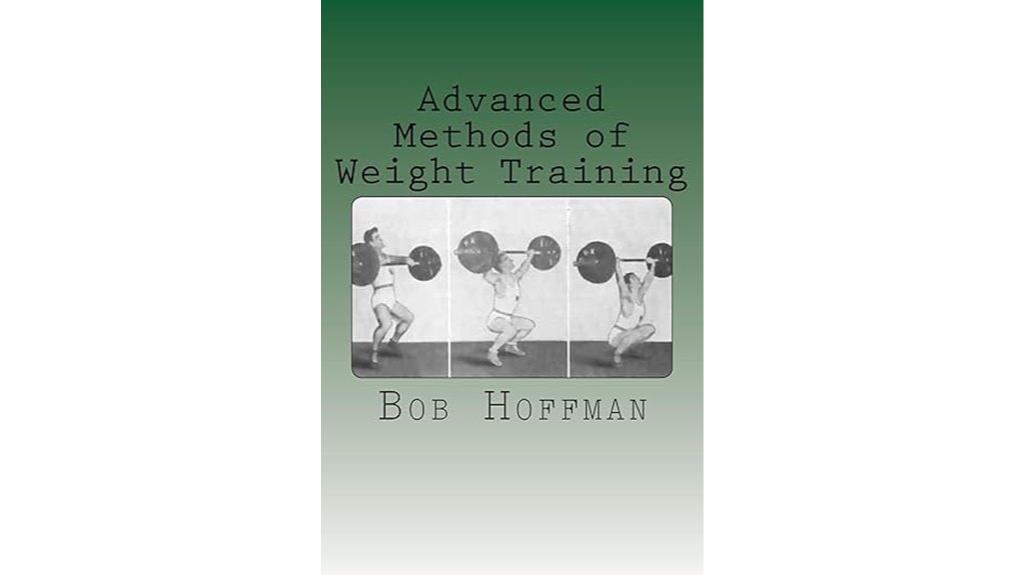
For serious lifters looking to refine their techniques, "Advanced Methods of Weight Training" stands out as an invaluable resource. This book, featuring insights from Bob Hoffman, dives into foundational exercise programs that truly elevate your training. You'll explore various methods like single set training, volume training, and muscle confusion, all introduced before they became popular. I found it entertaining and revealing, making the history of weight training accessible. While some reviews are mixed, the nostalgia and relevance of Hoffman's methods keep me engaged. If you're serious about your lifting journey, this book's worth a read—no doubt about it.
Best For: Serious lifters looking to refine their techniques and deepen their understanding of weight training history.
Pros:
- Offers a comprehensive overview of various effective training methods, including single set and volume training.
- Provides nostalgic insights from Bob Hoffman, a pioneer in the weight training field.
- Engaging and easy-to-read writing style that makes complex concepts accessible.
Cons:
- Mixed reviews regarding its usefulness for more educated gym enthusiasts.
- Some critiques on the writing quality compared to Hoffman's other works.
- Might not provide new information for advanced lifters already familiar with contemporary training methods.
Rubank Advanced Method – Clarinet Vol. 1 Music Book

The Rubank Advanced Method – Clarinet Vol. 1 is an excellent choice for strong high school freshmen and sophomores looking to elevate their skills. This book strikes a perfect balance between repertoire practice and essential technical exercises. It offers notated scales across various keys, classical solos, and engaging duets. Whether you're stepping back into clarinet after a break or aiming to refine your technique, this method's structured approach keeps you motivated. I've found the lesson plans particularly helpful in guiding my practice. With its effective content, it's no wonder many musicians return to this book throughout their careers.
Best For: Strong high school freshmen and sophomores, as well as clarinetists looking to rebuild their skills or refine their technique.
Pros:
- Engaging balance of repertoire practice and technical exercises keeps students motivated.
- Structured lesson plans facilitate effective practice and skill advancement.
- Highly recommended for a wide range of skill levels, making it versatile for different players.
Cons:
- May be too advanced for complete beginners without prior experience.
- Some users may find the scale practice repetitive over time.
- Limited variety in the types of exercises compared to other methods.
Advanced Method Writing
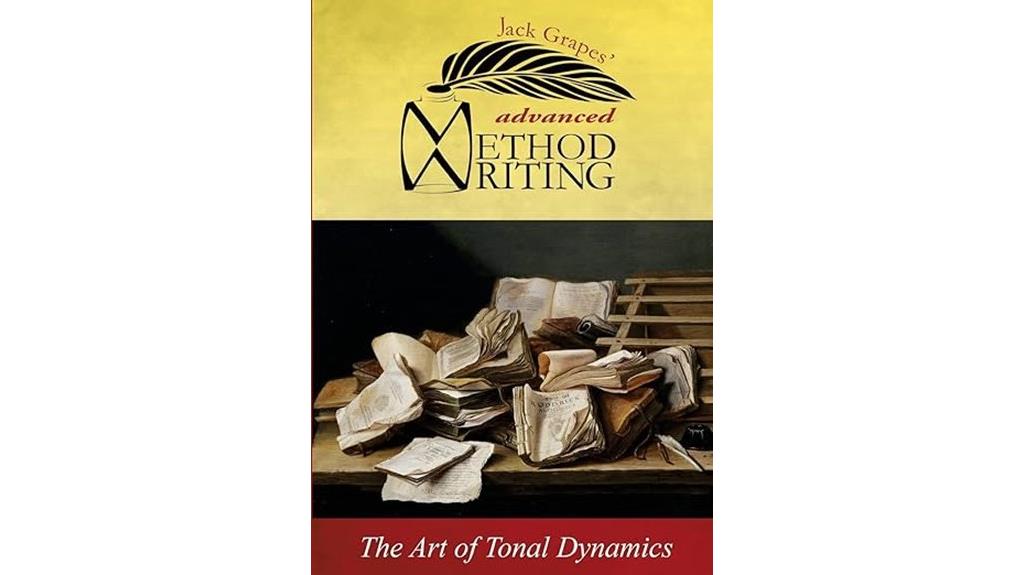
Writers looking to overcome blocks and refine their voice will find "Advanced Method Writing" by Jack Grapes to be an invaluable resource. This transformative system not only enhances writing but also fosters personal growth. Grapes' techniques are effective; I've seen peers impress literary professors and editors after applying his methods. Many writers, including myself, have experienced dramatic improvements in our craft. While some recommend alternatives like Oliver's and Lamott's works, Grapes' engaging style truly stands out. Despite minor criticisms regarding layout and clarity, the overall impact of his approach is life-changing for anyone serious about their writing journey.
Best For: Writers seeking to overcome blocks and refine their voice while also experiencing personal growth.
Pros:
- Effective techniques that lead to significant improvements in writing skills.
- Engaging teaching style that captivates and motivates writers.
- Positive testimonials from users who have successfully enhanced their craft.
Cons:
- Minor issues with typos that may distract some readers.
- Amateurish layout that could detract from the overall reading experience.
- Some content may not be easily accessible to all readers, leading to confusion.
Rubank Advanced Method Trombone or Baritone Songbook
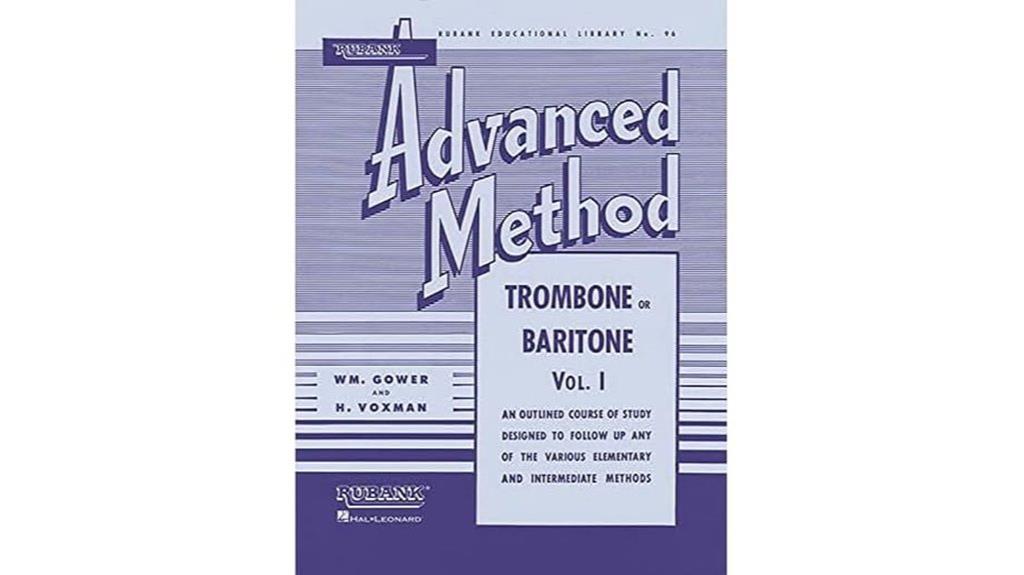
If you're a dedicated trombone or baritone player looking to sharpen your skills, the Rubank Advanced Method Songbook is an excellent choice. Priced at just $7.99, it offers incredible value. I've found it perfect for those with a few years of experience, including adults returning to the instrument. The exercises really help expand my range and strengthen my embouchure without feeling overwhelming. This book has a solid reputation, and many users, including myself, appreciate its challenging yet enjoyable studies. It's truly a resource that pushes me to improve while having fun with my playing. Highly recommended!
Best For: Players with several years of trombone or baritone experience, including adults returning to the instrument and serious high school trombonists.
Pros:
- Affordable price of $7.99 for high-quality material.
- Effective exercises that enhance range, slide positions, and embouchure strength.
- Widely recognized as a standard teaching tool for euphonium and trombone players.
Cons:
- May be too advanced for beginners or those with little experience.
- Some users might find specific exercises challenging or overwhelming.
- Limited to trombone and baritone; not suitable for other brass instruments.
Rubank Advanced Method Cornet or Trumpet Vol. 1
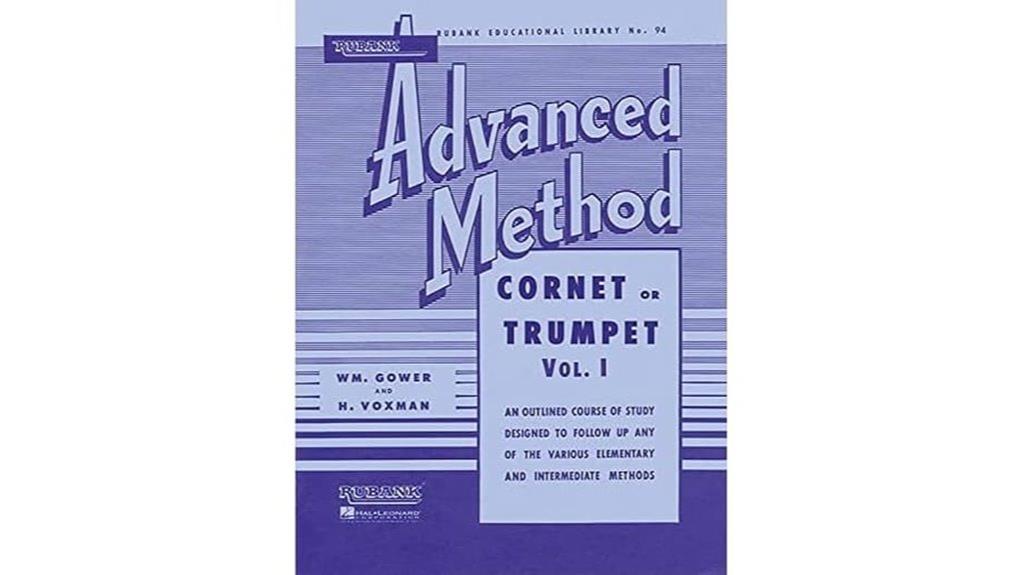
For serious trumpet or cornet players looking to refine their skills, the Rubank Advanced Method Cornet or Trumpet Vol. 1 stands out as an invaluable resource. This book is packed with essential scales, solos, and technique exercises that cater to advanced musicians. I've found it particularly effective in enhancing my playing, and many users echo similar sentiments. The clear layouts and high-quality print make studying enjoyable. While it may seem a bit dated, the content remains relevant, especially for those preparing for competitions. With dedication and perhaps some guidance, this book can truly elevate your trumpet skills.
Best For: Serious trumpet or cornet players looking to refine their skills and advance their technique.
Pros:
- High-quality printing and clear layouts enhance the learning experience.
- Comprehensive exercises and solos aid in preparation for competitions.
- Many users report significant improvement in their playing skills after using the book.
Cons:
- The content may feel somewhat dated compared to newer methods.
- Requires dedication and professional guidance for mastery beyond the intermediate level.
- Some players may find the exercises challenging without prior experience.
Rubank Advanced Method Flute Vol. 2
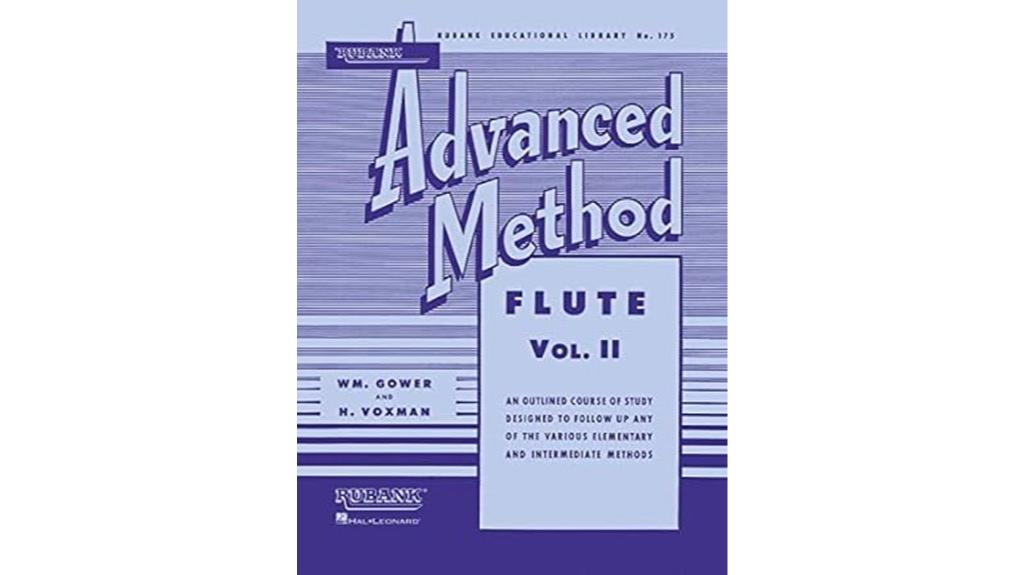
The "Rubank Advanced Method Flute Vol. 2" is an exceptional choice for dedicated flutists looking to refine their skills. I've been playing flute for six years, and this book has been invaluable in my daily practice. The variety of exercises, including scales, etudes, and duets, really helps me tackle challenging passages. I appreciate how it includes keys beyond the basics, pushing my limits further. It's structured well, covering theory and technique, which keeps my practice focused. I can't wait for my grandchildren to explore this book someday; it's truly a fantastic resource for advancing any flutist's journey.
Best For: Advanced flutists looking to enhance their technical skills and tackle challenging pieces in their practice.
Pros:
- Wide variety of exercises, including scales, etudes, and duets, to improve overall flute technique.
- Structured approach covering theory, technique, and daily practice in diverse keys, promoting focused learning.
- Affordable resource that is highly regarded by users for its value and effectiveness in advancing flute skills.
Cons:
- May be too challenging for complete beginners without prior experience on the flute.
- Some users might find the book's advanced level overwhelming if they haven't consistently practiced.
- Limited focus on pieces outside of the Rubank exercises, which could restrict exposure to a broader repertoire.
Advanced Methods in Family Therapy Research: A Focus on Validity and Change
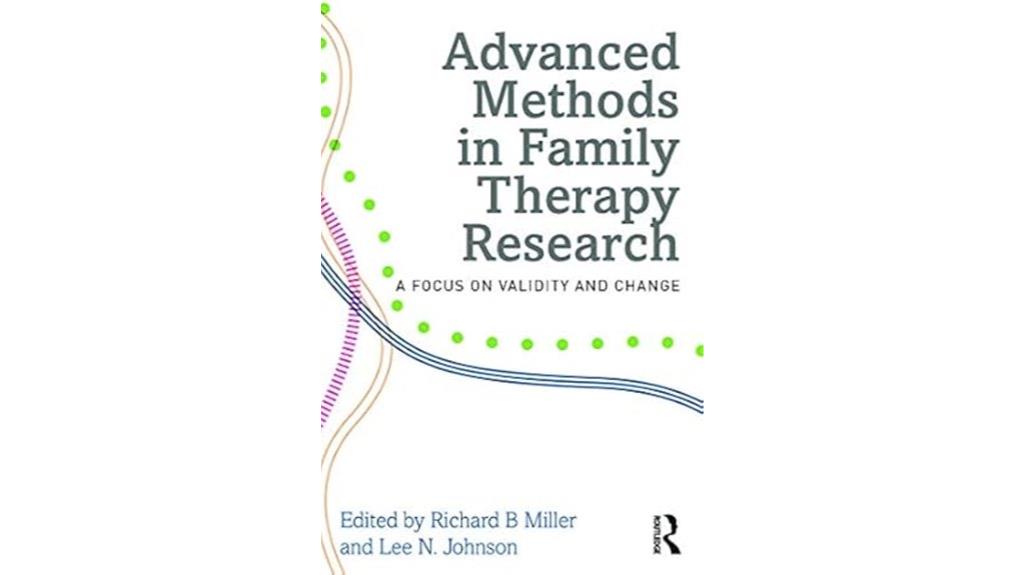
Researchers in family therapy looking to deepen their understanding of validity and change will find "Advanced Methods in Family Therapy Research: A Focus on Validity and Change" to be an invaluable resource. This book tackles vital issues of validity and reliability, making it essential for anyone serious about family therapy research. I appreciate how user-friendly the text is, breaking down complex concepts into manageable ideas. The contributions from respected thought leaders lend credibility, while its status as an excellent statistics textbook guarantees that I'm equipped with clear explanations and practical examples. I highly recommend adding this to your research library.
Best For: Researchers and practitioners in family therapy who seek to enhance their understanding of validity and reliability in their work.
Pros:
- User-friendly: The text simplifies complex concepts, making it accessible to a broad audience.
- Authoritative contributions: Contributions from respected experts enhance the book's credibility and relevance.
- Excellent statistics resource: Provides clear explanations and practical examples, making it one of the best statistics textbooks.
Cons:
- Niche focus: Primarily targets family therapy, which may not appeal to researchers in other fields.
- Advanced content: Some sections may be too complex for beginners in research methodologies.
- Limited scope: Focuses mainly on validity and reliability, potentially overlooking other important aspects of family therapy research.
Rubank Advanced Method: Saxophone, Vol. 2
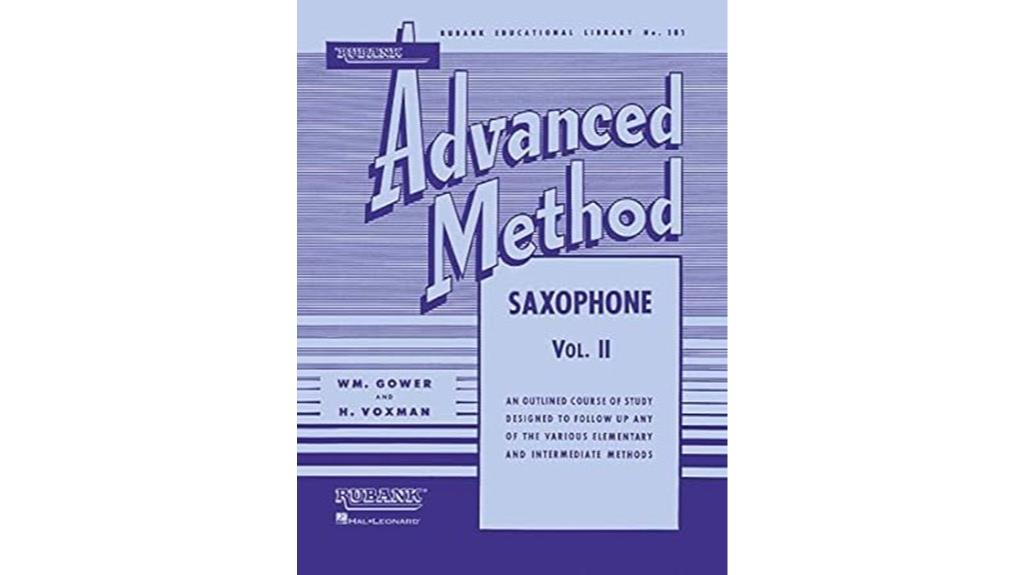
Advanced saxophonists looking to deepen their musical abilities will find the "Rubank Advanced Method: Saxophone, Vol. 2" an invaluable resource. This book enhances reading skills, rhythm, articulation, and technical proficiency. As a continuation of Vol. 1, it offers extensive scale practice, duets, and targeted exercises. I've personally seen my rhythm and sight-reading improve dramatically after using it. The structure of the etudes really helps solidify foundational skills, making it perfect for both teaching and self-study. Plus, I love how it brings back memories from my early days of learning. This method truly stands the test of time in music education.
Best For: Advanced saxophone players and educators looking to improve musical skills and reinforce foundational techniques.
Pros:
- Provides structured etudes and exercises that significantly enhance reading skills and rhythm.
- Suitable for both self-study and teaching, making it a versatile resource for educators.
- Users report a lasting positive impact on their musical abilities, with many recalling nostalgic memories associated with the book.
Cons:
- May be too advanced for beginner saxophonists or those not yet comfortable with foundational skills.
- Some users might find the exercises challenging without prior experience or guidance.
- Limited to saxophone, which may not appeal to musicians looking for a broader range of instruments or styles.
Rubank Advanced Method – French Horn in F or E-flat, Vol. 1
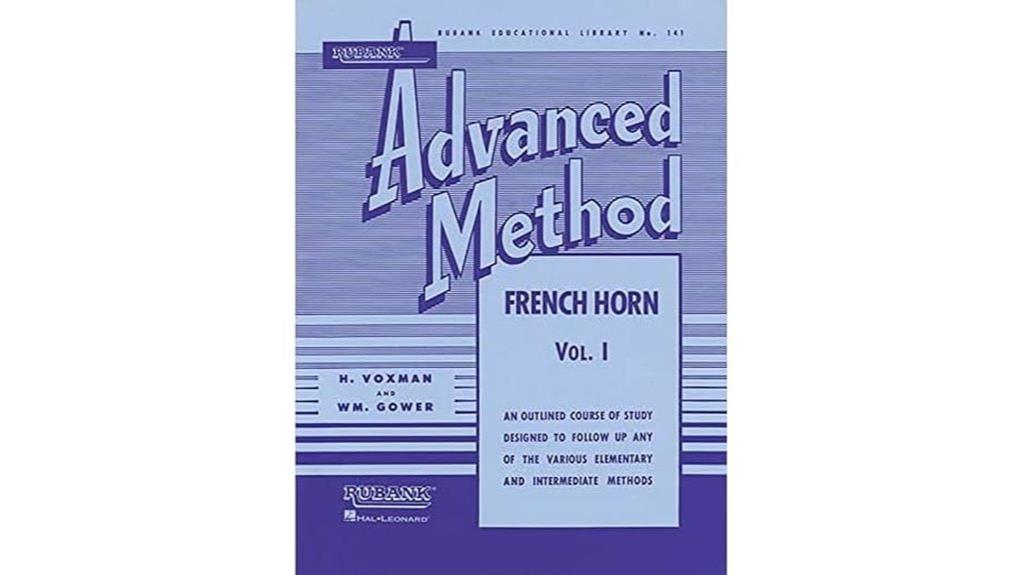
For intermediate French horn players looking to refine their skills, the "Rubank Advanced Method – French Horn in F or E-flat, Vol. 1" stands out as an essential resource. This classic method book offers a systematic approach to developing core skills, focusing on clear studies that challenge and enhance your playing. I appreciate how it complements other classical methods, making it a thorough guide. The positive feedback from both students and teachers confirms its effectiveness and relevance in today's lessons. Plus, with its long-standing reputation in music education, I trust it will elevate my musical journey considerably.
Best For: Intermediate French horn players seeking to refine their skills and enhance their musical journey.
Pros:
- Comprehensive resource that systematically develops core skills in French horn playing.
- Positive feedback from both students and teachers indicates its effectiveness in music education.
- Long-standing reputation in music instruction ensures trust and reliability.
Cons:
- May not be suitable for absolute beginners who require more foundational instruction.
- Focus on clear studies may lack the flashy elements that some students might prefer.
- As a classic method, it may not incorporate the latest pedagogical techniques or trends.
H. Voxman Rubank Advanced Method Clarinet Vol. 2
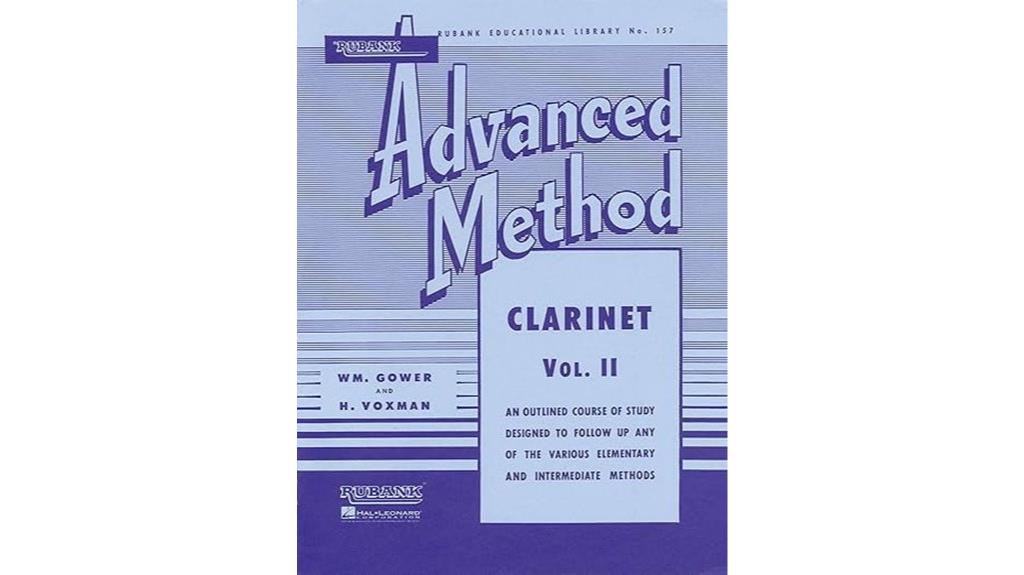
H. Voxman Rubank Advanced Method Clarinet Vol. 2 is my go-to resource for refining my clarinet skills. This book, organized by key signature, builds on Vol I with a clear progression. I love the variety of exercises—scales, duets, articulation, and solos—perfect for intermediate players like me. The etudes from lesser-known composers are particularly enjoyable. While I wish there were more altissimo exercises, the finger exercises keep me challenged. I found it useful for both teaching and self-study, making it a must-have for any clarinetist aiming to elevate their playing. Overall, it's been a valuable addition to my practice routine.
Best For: Intermediate clarinet players and older non-professional musicians looking to refine their skills and expand their repertoire.
Pros:
- Comprehensive organization by key signature facilitates structured learning.
- Includes a variety of exercises, making practice engaging and diverse.
- Features enjoyable etudes from lesser-known composers, enhancing performance experience.
Cons:
- Limited altissimo exercises may not meet the needs of advanced players.
- Some copies may have issues with incorrect page placement, affecting usability.
- Few performance pieces for higher notes, potentially limiting advanced practice.
Rubank Advanced Method: Oboe (Rubank Educational Library, 92)
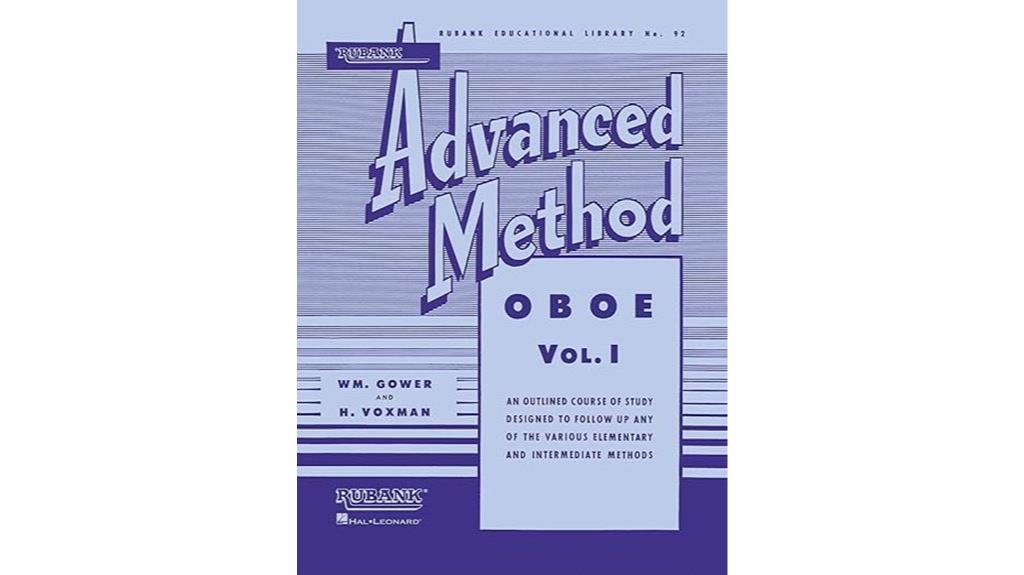
The Rubank Advanced Method: Oboe is an essential tool for dedicated oboe students enthusiastic to refine their skills and tackle various keys. This book's reputation among instructors speaks volumes about its effectiveness. I've found its structured content incredibly helpful for mastering the oboe. The fold-out fingering chart simplifies tricky notes, and the music selections are a joy to play. Many parents I know appreciate its organization, making practice more enjoyable for their kids. With its long-standing presence in oboe education, I can confidently say it's a reliable resource that supports consistent improvement and nurtures a love for music.
Best For: Dedicated oboe students looking to refine their skills and master various keys.
Pros:
- Comprehensive and structured content that aids in mastering the oboe.
- Includes a fold-out fingering chart for ease of learning tricky notes.
- Beautifully curated music selections that enhance the practice experience.
Cons:
- May be considered too traditional for those seeking contemporary methods.
- Some users might find the pace of the book slow if they are more advanced.
- Limited to oboe-specific content, which may not suit multi-instrumentalists.
Advanced Mathematical Methods for Scientists and Engineers
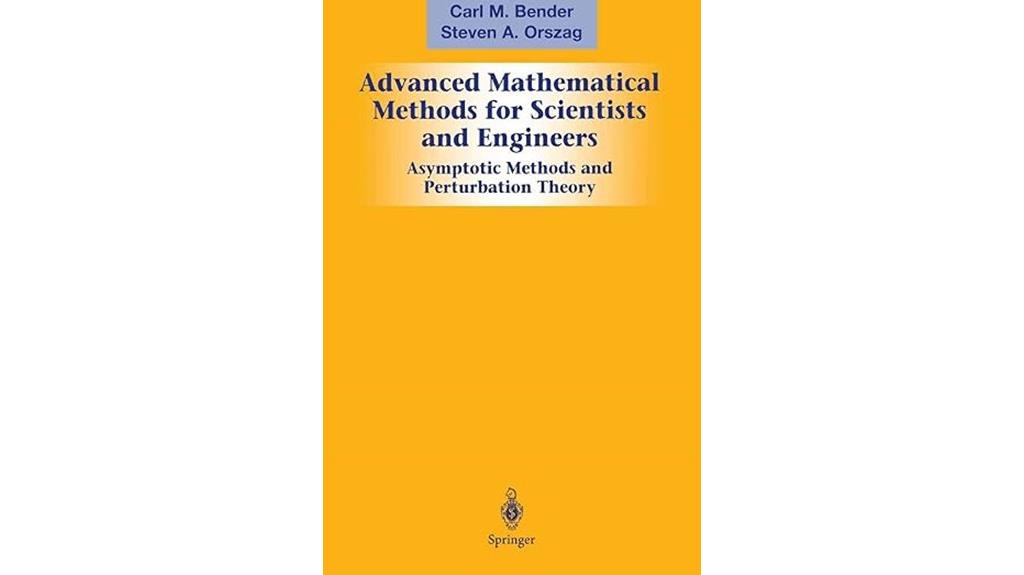
Advanced Mathematical Methods for Scientists and Engineers offers an invaluable resource for anyone enthusiastic to deepen their understanding of complex mathematical concepts, especially those in fields like physics and engineering. This book, despite its first printing in 1978, covers essential methods such as asymptotic expansions and perturbation theory, which are often overlooked in traditional texts. I found its engaging style and practical applications particularly helpful for tackling real-world problems. With numerous examples and challenges, it's perfect for advanced undergraduates and even high school students. Overall, it's a fantastic tool to elevate your skills and spark curiosity in mathematical physics!
Best For: Advanced undergraduates, graduate students, and high school students with a basic calculus background who are interested in deepening their understanding of mathematical methods in physics and engineering.
Pros:
- Comprehensive coverage of asymptotic methods and perturbation theory not typically found in traditional texts.
- Engaging writing style with numerous illustrative examples and challenging problems that enhance learning.
- Practical applications in real-world problems make complex concepts more accessible and relevant.
Cons:
- Production quality is subpar, with criticisms regarding the print quality.
- Some material may be too advanced for beginners without a solid mathematical foundation.
- Limited discussions on topics outside the focus areas of asymptotic methods and perturbation theory.
Factors to Consider When Choosing Advanced Methods

When I think about choosing advanced methods to enhance my skills, I consider several key factors. It's essential to evaluate my target skill level, the relevance of the content, and how I can apply what I learn. Additionally, I look into the practice structure and overall user experience to guarantee I'm making the right choice.
Target Skill Level
Choosing the right advanced methods hinges on understanding your current skill level, as this guarantees the material challenges you without being overwhelming. I've found that materials aimed at intermediate players often include structured exercises that reinforce foundational skills while introducing more complex concepts, making them perfect for those moving on to advanced levels. For learners with a solid foundation, advanced resources typically mix technical exercises and repertoire, allowing for skill refinement. It's also important to evaluate specific books or methods tailored to different experience levels, whether you're an older non-professional player or a serious high school student. By grasping the progression outlined in these methods, I've been able to identify the right starting point, ensuring I engage with content that matches my abilities and goals.
Content Relevance
Understanding your skill level sets the stage for selecting advanced methods that truly resonate with your learning journey. I've found that content relevance is crucial; it guarantees the material aligns with my educational needs and goals, making learning much more effective. When choosing advanced methods, I look for thorough coverage of essential skills and techniques applicable to my field. An organized structure, progressing from fundamental to advanced topics, really helps me grasp complex ideas. I also appreciate content that incorporates practical applications and real-world examples, as they bridge the gap between theory and practice. Finally, I pay attention to feedback and user experiences, as they often reveal the effectiveness and relevance of the content I'm considering.
Teaching Applications
As I explore advanced teaching methods, I realize several key factors shape my choices in instructional strategies. First, I appreciate how structured approaches enhance understanding of complex concepts, enabling effective skill development. I also find that incorporating diverse exercises and assessments keeps students engaged and caters to various learning styles, fostering deeper comprehension. Utilizing pedagogical tools, like fingering charts or instructional guides, reinforces foundational skills and encourages consistent practice. Additionally, feedback mechanisms, such as peer evaluations and instructor assessments, are essential for helping learners identify improvement areas and track progress. Finally, I value a well-structured curriculum that balances theoretical discussions with practical applications, enriching the educational experience and cultivating a deeper appreciation for the subject matter.
Practice Structure
While developing an effective practice structure, I've found that balancing technical exercises with musical pieces is vital for thorough skill development. I always include a mix of scales and fingerings alongside my favorite pieces to guarantee I'm working on both technique and artistry. It's imperative to progress systematically through lessons, mastering each skill before moving on to avoid gaps in my knowledge. I also incorporate varied exercises, like duets and etudes, to enhance my musicality and refine aspects like articulation and timing. Regularly revisiting foundational exercises keeps my essential skills sharp, even as I advance. Finally, I establish clear goals for each session, which helps me focus my efforts and track my progress effectively.
User Experience
When choosing advanced methods, I find it's crucial to reflect on how user experience affects the learning process. Positive testimonials often reveal that users appreciate well-structured content, which enhances their overall satisfaction. I've noticed that engaging writing styles and relatable examples can turn complex concepts into something more digestible, improving understanding and retention. Additionally, practical applications and user-friendly features, like charts or clear layouts, make the learning journey smoother and more enjoyable. It's also important to take into account the longevity and reputation of resources; I trust materials with a proven track record, as they often come highly recommended by educators and peers. Ultimately, a positive user experience can greatly boost the effectiveness of any advanced learning method I choose.
Instructional Quality
Choosing advanced methods hinges on the instructional quality of the materials you encounter. I always look for clarity and structure in the content, ensuring it logically progresses from basics to advanced applications. Extensive coverage of relevant topics is essential, as it allows me to engage with various techniques applicable to my field. I pay attention to user feedback, as positive reviews often highlight how easily I can understand the material and apply it practically. Varied exercises and real-world examples are vital, providing me opportunities to connect theory with practice. Finally, I appreciate resources that accommodate different learning styles, as they enhance my understanding and support my self-study efforts, ultimately elevating my skills and expertise.
Resource Availability
Instructional quality lays the groundwork for effective learning, but resource availability plays an essential role in how I engage with advanced methods. Access to high-quality materials like textbooks, research papers, and instructional videos is necessary for deepening my understanding. I find that online databases and libraries offer an abundance of these resources, which greatly enhances my learning experience. Supplementary materials such as practice exercises and example problems are invaluable for mastering complex topics. Additionally, I love participating in study groups and workshops; they provide fresh insights and support. It's also critical to guarantee that the resources I use are up-to-date and relevant, as methodologies in advanced fields can change rapidly. Keeping my resources current helps me stay ahead.
Frequently Asked Questions
How Can I Incorporate Advanced Methods Into My Daily Routine?
I've found that incorporating advanced methods into my daily routine starts with setting clear goals. I break down complex tasks into manageable steps, using tools like time-blocking to stay focused. I also dedicate time for reflection, evaluating what's working and what isn't. Engaging in continuous learning, like online courses or podcasts, keeps me inspired. Finally, I make it a point to practice regularly, ensuring I'm applying what I learn consistently.
What Are the Key Differences Between Beginner and Advanced Methods?
Think of learning as climbing a mountain. Beginners focus on the basics—finding their footing and mastering simple techniques. As I advance, I tackle steeper paths, applying complex strategies and refining my skills. The key differences lie in depth and application; advanced methods demand critical thinking and adaptability. I'm no longer just following a trail; I'm forging my own. Embracing these challenges helps me reach new heights in my journey.
Are Advanced Methods Suitable for All Skill Levels?
I've found that advanced methods aren't always suitable for everyone, especially beginners. They often require a solid foundation and understanding of the basics first. If I dive straight into advanced techniques without mastering the fundamentals, I risk becoming overwhelmed and frustrated. It's essential to assess your current skill level and gradually build up to those more complex methods. Tailoring your approach to your skill level can lead to more effective learning and growth.
How Can I Measure My Progress Using Advanced Methods?
Did you know that 70% of learners find it challenging to measure their progress? I've faced that struggle myself. To measure my progress using advanced methods, I set clear, specific goals and track my achievements regularly. I also use metrics, like completion rates or skill assessments, to gauge improvement. Reflecting on my learning journey helps me stay motivated, and I adjust my strategies based on what I discover about my progress.
What Resources Complement Advanced Methods for Skill Enhancement?
When I think about resources that complement advanced methods for skill enhancement, I find a mix of books, online courses, and mentorship invaluable. I often immerse myself in specialized literature that deepens my understanding. Online platforms like Coursera or Udemy offer targeted courses that help me refine specific skills. Plus, connecting with mentors who've mastered what I'm learning really boosts my growth. These resources have consistently supported my journey toward expertise.
Conclusion
Ultimately, exploring advanced methods in your field can truly elevate your skills and expertise. For instance, studies show that individuals who engage in structured advanced training programs see a 30% improvement in their proficiency within just a few months. Whether it's mastering an instrument with the Rubank series or enhancing your physical fitness, these methods can make a significant difference. So, why not immerse yourself in one of these resources? You might just access your full potential!









